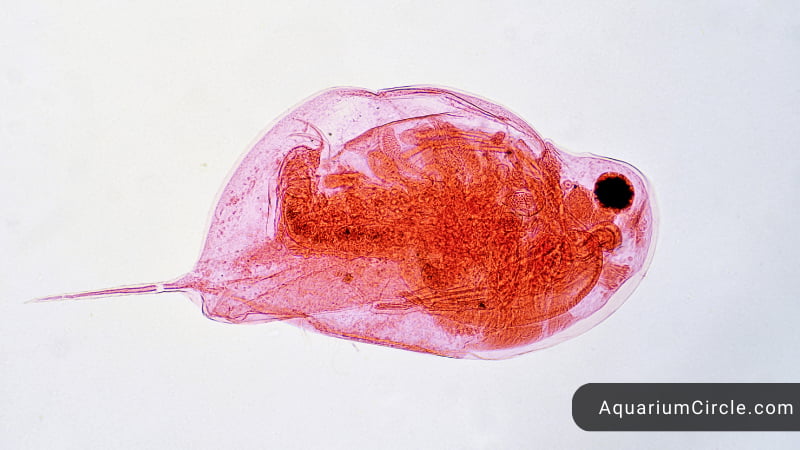Betta fish, also known as Siamese fighting fish, are popular tropical fish among fish enthusiasts due to their vibrant colors and elegant fins. As with any pet, it is essential to provide Betta fish with a well-balanced diet to promote their overall health and longevity. While commercial fish food can provide essential nutrients, it is always beneficial to supplement their diet with natural, nutritious treats. One such treat that has gained popularity among Betta keepers is Daphnia.
Daphnia is a type of small freshwater crustacean that is high in protein, vitamins, and minerals, making it a beneficial addition to a Betta fish’s diet. In this blog post, we will explore the benefits of feeding Daphnia for Betta fish, how to feed it to them, and other considerations to keep in mind when incorporating Daphnia into their diet.
See also:
- Why My Betta Fish Won’t Eat? 11 Reasons In Depth That Have Immediate Solutions
- Betta Fish Spitting Out Food: 6 Crucial Reasons You May Not Know
- Snails For Betta Tank: 5 Benefits Of Them In Your Aquarium And Guide To Keep Them Live Together Peacefully
Brief Description Of Daphnia
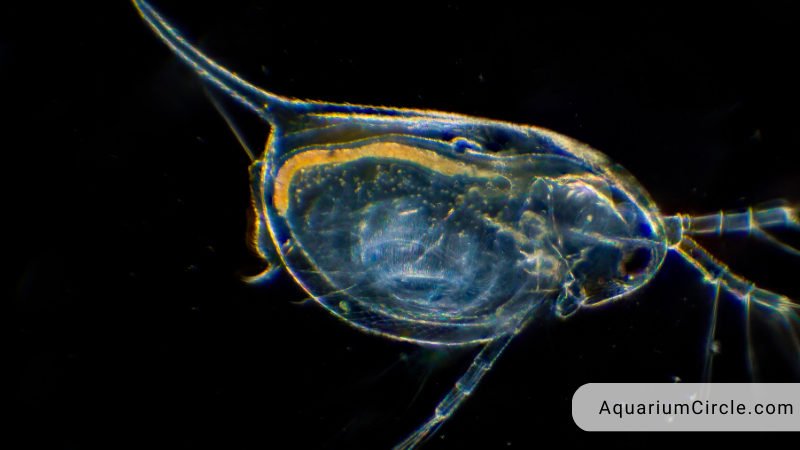
Daphnia is a genus of small, freshwater crustaceans that belong to the family Daphniidae. They are typically less than 5mm in size and are transparent or translucent, with a distinctive, oval-shaped body. Daphnia also have a relatively large antenna, which they use to filter feed on algae and other small particles in the water.
Daphnia are known for their unique swimming behavior. They use a pair of branched antennae to propel themselves through the water, creating a series of small, rapid movements that give them the appearance of “jumping” through the water. This behavior is thought to help Daphnia avoid predators and capture food more effectively.
In addition to their unique appearance and behavior, Daphnia play an important role in freshwater ecosystems. They are a valuable food source for many aquatic organisms, including fish and amphibians, and can help to regulate algae and other microorganisms in the water.
Types Of Daphnia Available On The Market Recently
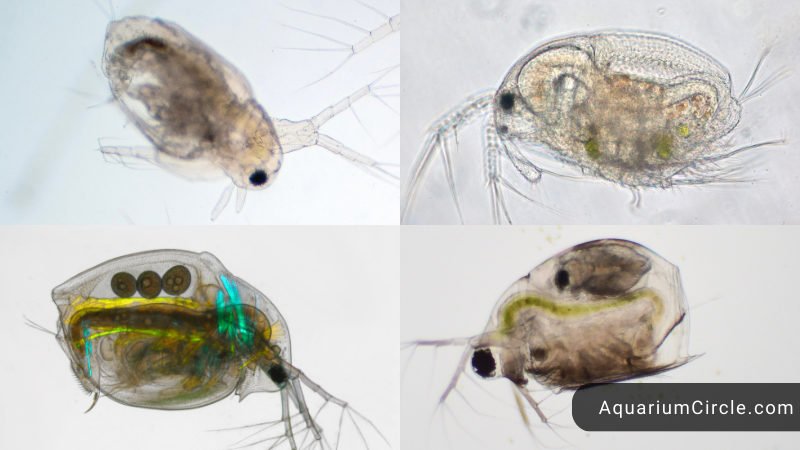
There are several types of Daphnia that are available in the market, including:
- Daphnia magna: This is one of the most commonly available types of Daphnia. It is larger in size and has a higher nutritional value than other species. It is a good source of protein, vitamins, and minerals, making it an excellent food source for Bettas.
- Daphnia pulex: This is a smaller species of Daphnia that is also commonly available. It is a good source of protein and is often used as a food source for small aquarium fish.
- Moina: Moina is a smaller, freshwater crustacean that is often sold as a substitute for Daphnia. It has a similar nutritional profile to Daphnia and is a good source of protein, vitamins, and minerals.
- Bosmina: Bosmina is another small freshwater crustacean that is sometimes sold as a food source for aquarium fish. It is not as commonly available as Daphnia or Moina, but can be a good alternative if other types are not available.
In addition to the types of Daphnia, there are three ways to obtain Daphnia. Let’s discuss their advantages and disadvantages:
- Live Daphnia: This is the most common way to feed them Daphnia. Live Daphnia is rich in protein and fiber, which aid digestion, and stimulates the Betta fish’s hunting instincts. However, it is essential to purchase Daphnia from a reputable seller to ensure it is free from parasites, bacteria, or harmful chemicals. Live Daphnia does not last long and requires frequent restocking.
- Frozen Daphnia: Another popular and convenient method of feeding Bettas is using frozen Daphnia. It is nutritionally beneficial, easy to store, and readily available. However, it can be challenging to feed as it needs to be thawed before feeding, which can delay feeding time. It is essential to purchase from a reputable seller to ensure quality, and it can also produce an unpleasant odor.
- Freeze-Dried Daphnia: This method combines the advantages of frozen and live Daphnia. It is free from parasites and bacteria and has a long shelf life. Freeze-dried Daphnia is also easy to store and has a natural taste that Betta fish love. However, it can expand in the fish’s stomach and cause harm, so it is recommended to soak it in water before feeding. It is harder to find, and it is not recommended to feed it too often to Bettas.
Each method has its benefits and drawbacks, and Betta fish owners should choose the method that best suits their needs and preferences. It is essential to ensure the quality of the Daphnia and not overfeed the fish.
Why Is Daphnia Good For Betta Fish?
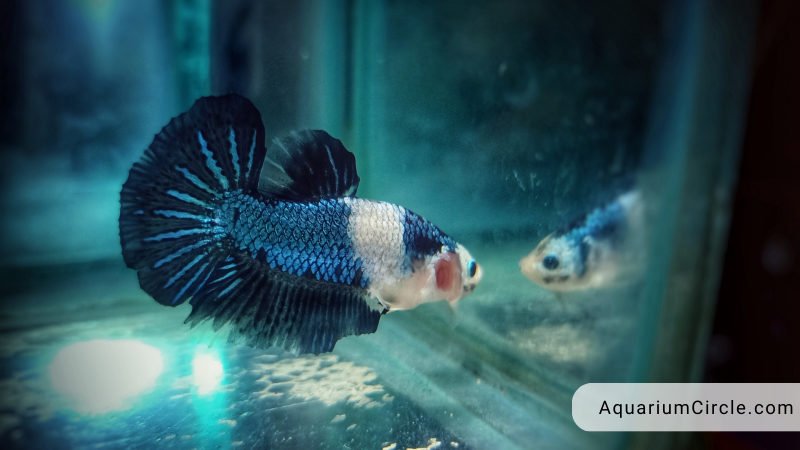
Daphnia is a nutritious and beneficial food source for Betta fish that offers several health benefits, including:
High nutritional value
Daphnia is an excellent source of nutrition for Betta fish. It contains high levels of protein, which is essential for growth and development, as well as vitamins and minerals that support overall health. The protein in Daphnia is also easily digestible, making it an ideal food source for Betta fish. By incorporating Daphnia into their diet, Betta may receive the necessary nutrients to thrive and maintain good health.
Natural laxative
Constipation is a common problem among Betta fish, which can lead to bloating, discomfort, and other health issues. Daphnia is a natural laxative that can help to relieve constipation in Betta fish. The high fiber content in Daphnia will help to promote healthy digestion and bowel movements, making it an effective remedy for constipation.
Promotes healthy digestion
Daphnia can also help to promote healthy digestion in Betta fish. By stimulating the Betta fish’s digestive system, Daphnia can help to prevent digestive issues such as bloating, constipation, and swim bladder disease. By incorporating Daphnia into their diet, Betta fish can maintain good digestive health and avoid these common health problems.
See also: Dropsy Betta – Symptoms, Causes And How To Treat Dropsy In Betta Fish
Improves immune function
Daphnia is rich in antioxidants, which can help to boost the Betta fish’s immune system and protect against disease. Antioxidants are important for neutralizing harmful free radicals in the body, which can damage cells and weaken the immune system. By providing Betta fish with a source of antioxidants through Daphnia, they can improve their immune function and stay healthy.
Provides enrichment
Offering Daphnia to Betta fish can provide them with a source of enrichment and mental stimulation. Daphnia is a live food source that Betta fish can chase and hunt, which can encourage natural behaviors and provide mental stimulation. By incorporating Daphnia into their diet, Betta fish can experience a more varied and interesting diet, which can improve their overall well-being.
Can We Use Daphnia For Betta Fish Constipation?
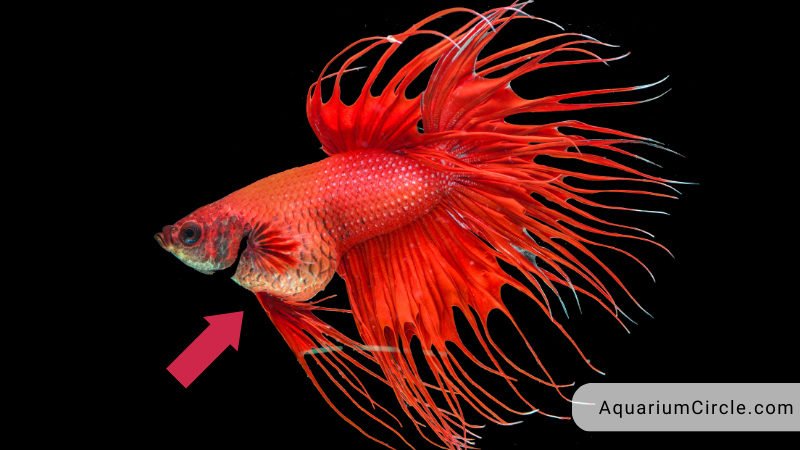
Yes, Daphnia can be used as a natural laxative for Betta fish that are suffering from constipation. Constipation is a common problem among Betta fish, which can be caused by overfeeding or feeding inappropriate food. Daphnia contains high levels of fiber, which can help to promote healthy digestion and bowel movements, thereby relieving constipation.
Here are some signs of constipation in Betta fish that you – the fish keeper should be aware of:
- Lethargy: Constipated Betta fish may appear lethargic and spend more time resting at the bottom of the tank.
- Decreased appetite: Constipation can cause a loss of appetite in Betta fish.
- Bloated or swollen abdomen: A Betta fish with constipation may have a bloated or swollen abdomen that looks larger than usual.
- Difficulty swimming: Constipated Betta fish may have difficulty swimming or struggle to maintain their balance in the water.
- Stringy or discolored feces: Constipation can cause the Betta fish’s feces to become stringy or discolored, or they may have trouble passing it altogether.
How To Feed Daphnia To Bettas?
Feeding Daphnia to Betta fish is a simple process that requires some basic preparation. Here are some steps to follow when feeding Daphnia to your Betta fish:
- Purchase Daphnia: Daphnia can be purchased in various forms, including live, frozen, or freeze-dried. It is essential to ensure that the Daphnia is of high quality and free from harmful bacteria or parasites. It is also recommended to purchase Daphnia from a reputable source.
- Thaw or Rehydrate: Depending on the form of Daphnia you have purchased, you may need to thaw or rehydrate it before feeding it to your Betta fish. Frozen Daphnia should be thawed in a small container of aquarium water before being fed to your fish. Freeze-dried Daphnia should be rehydrated in a small container of aquarium water for several minutes before feeding.
- Feed in Small Quantities: It is essential not to feed too much Daphnia; you should only give them a small amount of Daphnia to prevent overfeeding and ensure that they receive a well-balanced diet. It is recommended to offer Daphnia as a supplement to their regular diet, rather than as the primary food source.
- Observe Your Betta Fish: After feeding Daphnia to your Betta fish, it is important to observe their behavior and ensure that they are eating it. Some Betta fish may be hesitant to eat Daphnia at first, while others may eagerly chase after it. If your Betta fish does not eat the Daphnia, remove it from the tank to prevent it from fouling the water.
- Avoid Overfeeding: Overfeeding Betta fish with Daphnia or any other food can lead to health problems such as bloating, constipation, and swim bladder disease. It is recommended to feed Betta fish small amounts of food 2-3 times a day, rather than a large amount once a day.
By following these steps, you can safely and effectively feed Daphnia to your Betta fish. Remember to monitor your Betta fish’s behavior and adjust their feeding schedule and diet as needed to ensure their health and well-being.
Can You Feed Your Betta Fry Daphnia?
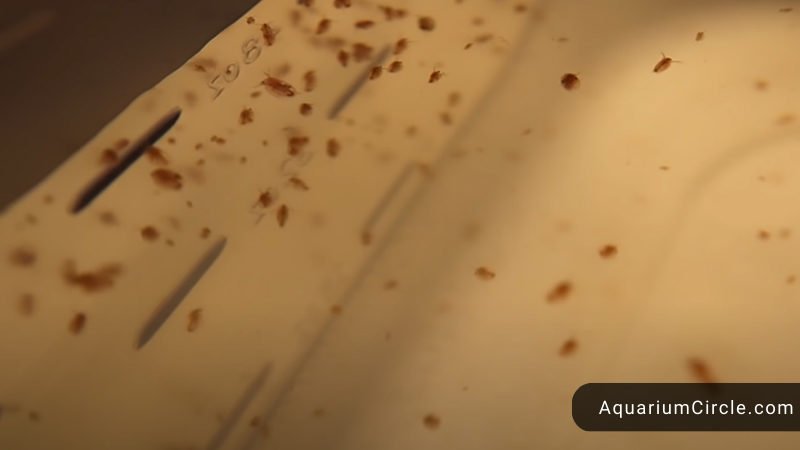
Daphnia can be a suitable food source for Betta fry. Betta fry have small stomachs and require frequent feedings of small amounts of food to grow and develop properly. Daphnia is a suitable food source for Betta fry as it is small in size and easy for them to digest.
However, it is essential to ensure that the Daphnia is of appropriate size for the Betta fry and does not pose a choking hazard. It is recommended to purchase smaller-sized Daphnia for Betta fry and offer it in small quantities throughout the day.
Additionally, it is essential to ensure that the Daphnia is of high quality and free from harmful bacteria or parasites. It is recommended to purchase Daphnia from a reputable seller and avoid collecting it from outdoor sources, as it may be contaminated with harmful substances.
In summary, Daphnia can be a suitable food source for Betta fry, but it is essential to ensure that it is of appropriate size, high quality, and offered in small quantities throughout the day. By incorporating Daphnia into their diet, Betta fry can receive the necessary nutrients to grow and develop properly.
See also: How To Breed Betta Fish At Home? Detailed Step-by-step Guide For You
Video About Daphnia For Betta Fish
FAQs
What is Daphnia?
Daphnia is a type of small freshwater crustacean that is often used as a food source for aquarium fish.
What are the benefits of feeding Daphnia to Betta fish?
Daphnia is a nutritious and delicious treat for Betta fish that provides a range of health benefits. It is a natural laxative, contains high levels of protein and vitamins, and helps to promote healthy digestion and immune function.
How often should I feed my Betta fish Daphnia?
It is recommended to feed Daphnia to Betta fish as a treat or supplement to their regular diet, rather than as a primary food source. You can offer Daphnia to your Betta fish a few times a week, depending on their appetite and dietary needs.
Can Daphnia be harmful to Betta fish?
In general, Daphnia is considered safe for Betta fish to consume. However, it is important to ensure that the Daphnia you feed your Betta fish is of high quality and free from harmful bacteria or parasites. It is also recommended to avoid overfeeding Daphnia to prevent digestive issues.
Where can I buy Daphnia for my Betta fish?
You can find Daphnia at many pet stores, aquarium supply shops, or online retailers that specialize in aquarium supplies. It is important to choose a reputable source of Daphnia to ensure its quality and safety for your Betta fish.
References:

Annette M. Chaney is an experienced marine biologist with over 20 years of experience as an aquarist and fishkeeper. She started her first aquarium at a young age, filling it with frogs and goldfish obtained from the ten-cent pet store.
Annette grew up caring for and breeding African Cichlids, which led to a hobby in high school that doubled as a profitable means. Attending Reed College gave her time to solidify herself as an accomplished aquarium caretaker with an eye for sales. After that, from 2009 – 2013, she studied at Roger Williams University – one of the most prestigious universities for Aquaculture and Aquarium in USA. She is the founder of AquariumCircle since 2010.
